Analyzing HR Skills, Personal Audit, and Development for Whirlpool
VerifiedAdded on 2020/10/22
|17
|5012
|59
Report
AI Summary
This report analyzes the HR skills, personal audits, and development strategies required for effective human resource management within the context of a Whirlpool case study. The introduction highlights the importance of employee and team development for organizational success, emphasizing the role of HR managers in identifying employee needs, fostering teamwork, and implementing training programs. Task 1 focuses on the essential skills, knowledge, and behaviors of an HR professional, including organizing people, teamwork, communication, and legal knowledge. Task 2 delves into a personal skill audit, evaluating strengths and weaknesses in areas such as team building, conflict resolution, decision-making, and IT skills, followed by a detailed personal development plan addressing identified areas for improvement through learning objectives, target proficiencies, development opportunities, and success criteria. The report emphasizes the need for continuous learning and professional development to adapt to changing market demands and achieve competitive advantages. The analysis includes the importance of adaptability, accountability, and the application of skills like presentation and information technology skills. The report offers insights into performance management, conflict resolution and decision making.
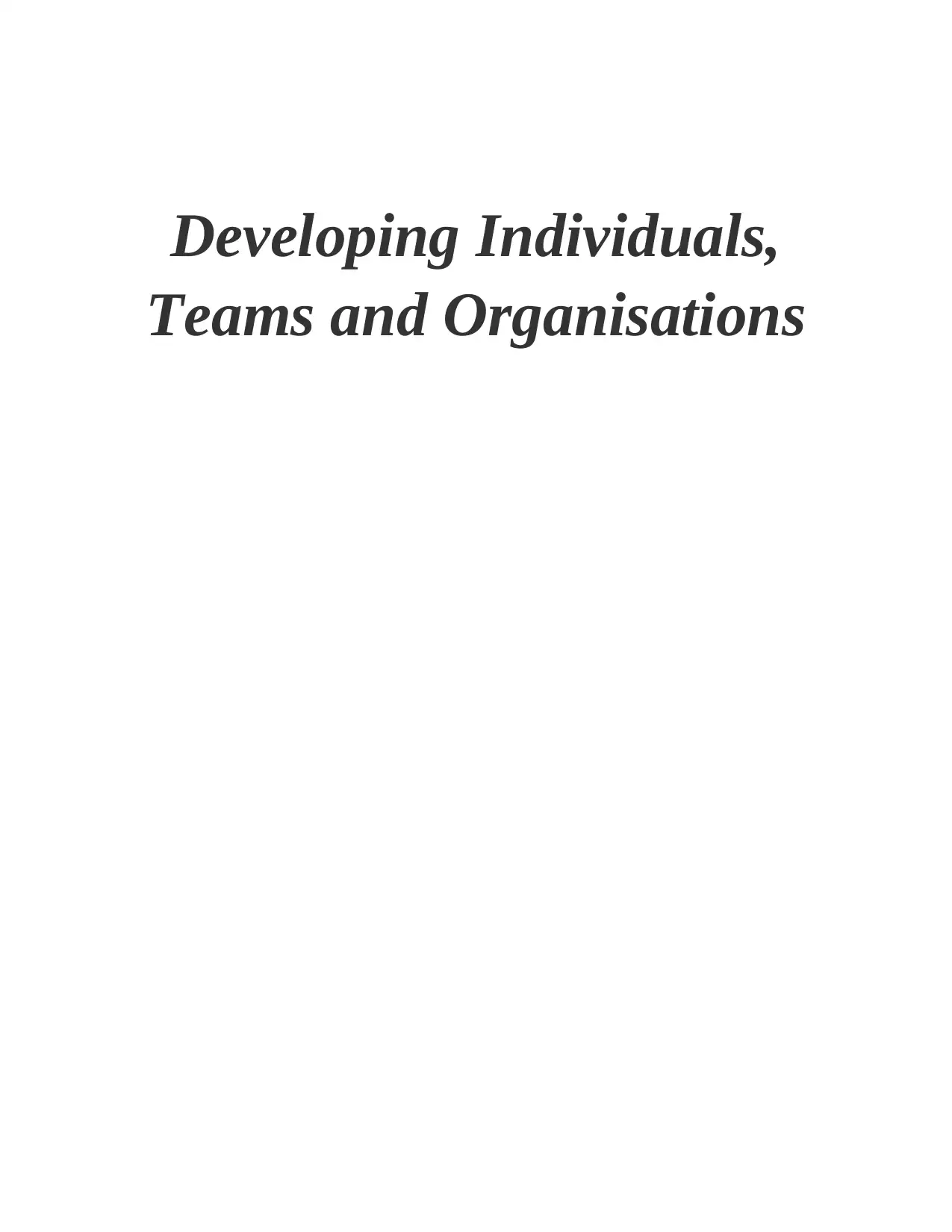
Developing Individuals,
Teams and Organisations
Teams and Organisations
Paraphrase This Document
Need a fresh take? Get an instant paraphrase of this document with our AI Paraphraser
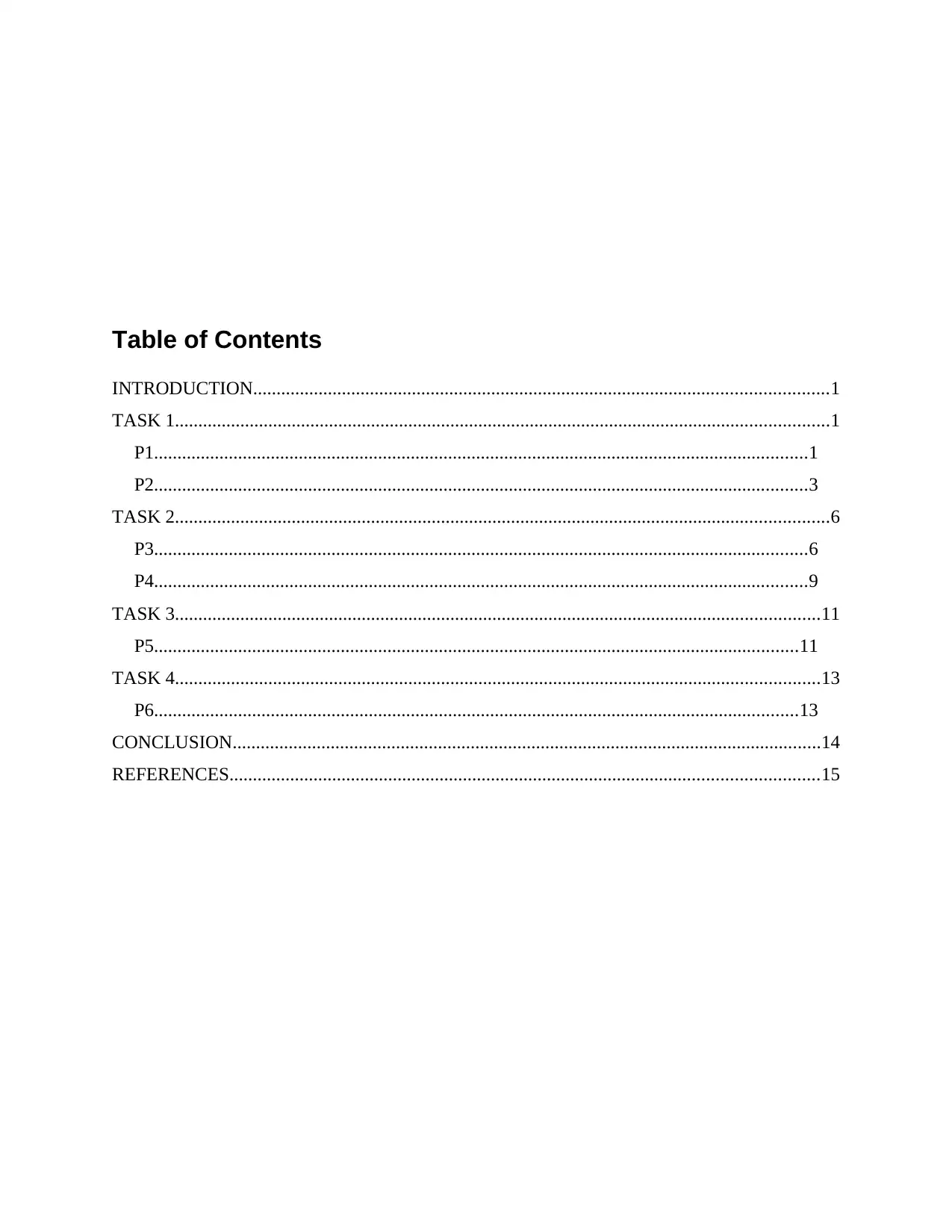
Table of Contents
INTRODUCTION...........................................................................................................................1
TASK 1............................................................................................................................................1
P1............................................................................................................................................1
P2............................................................................................................................................3
TASK 2............................................................................................................................................6
P3............................................................................................................................................6
P4............................................................................................................................................9
TASK 3..........................................................................................................................................11
P5..........................................................................................................................................11
TASK 4..........................................................................................................................................13
P6..........................................................................................................................................13
CONCLUSION..............................................................................................................................14
REFERENCES..............................................................................................................................15
INTRODUCTION...........................................................................................................................1
TASK 1............................................................................................................................................1
P1............................................................................................................................................1
P2............................................................................................................................................3
TASK 2............................................................................................................................................6
P3............................................................................................................................................6
P4............................................................................................................................................9
TASK 3..........................................................................................................................................11
P5..........................................................................................................................................11
TASK 4..........................................................................................................................................13
P6..........................................................................................................................................13
CONCLUSION..............................................................................................................................14
REFERENCES..............................................................................................................................15
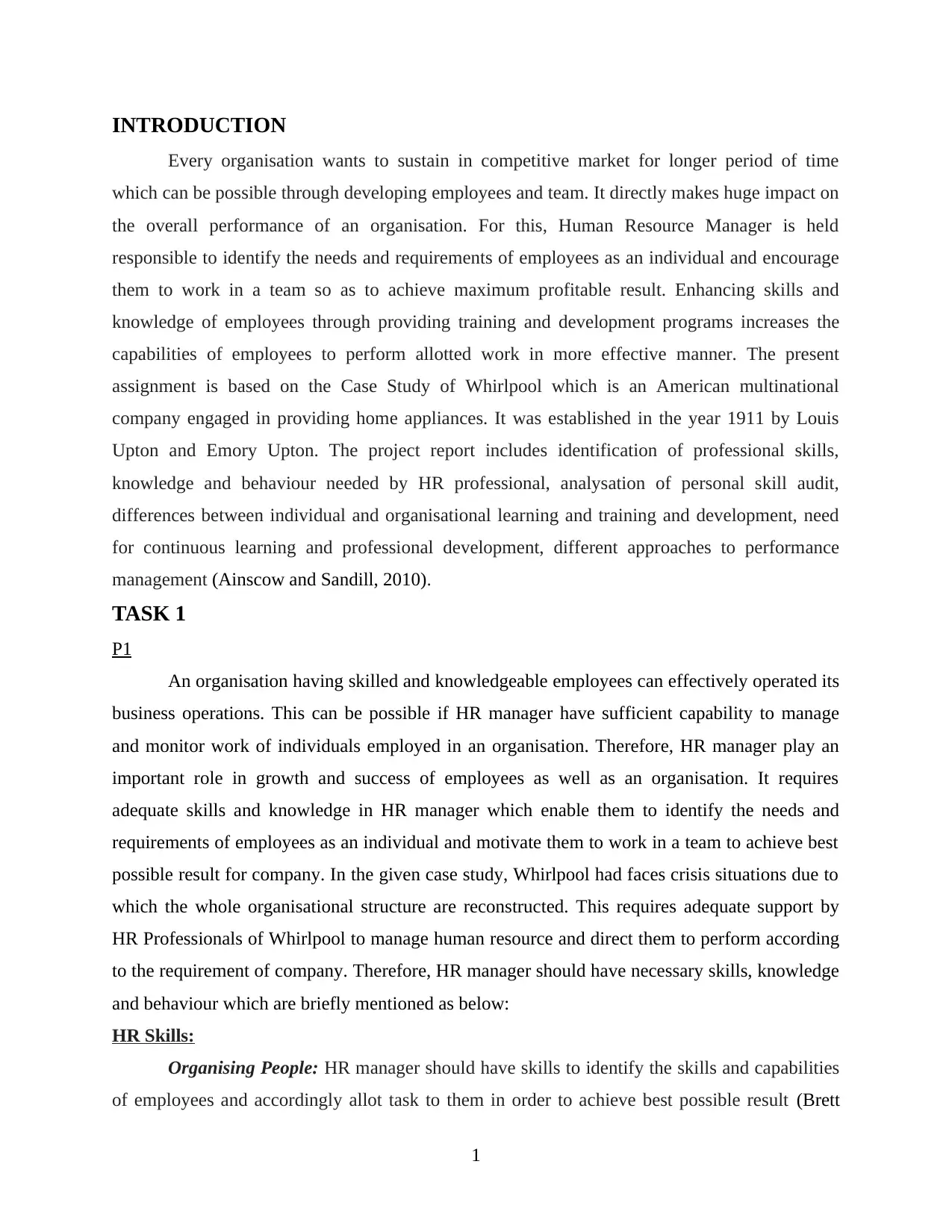
INTRODUCTION
Every organisation wants to sustain in competitive market for longer period of time
which can be possible through developing employees and team. It directly makes huge impact on
the overall performance of an organisation. For this, Human Resource Manager is held
responsible to identify the needs and requirements of employees as an individual and encourage
them to work in a team so as to achieve maximum profitable result. Enhancing skills and
knowledge of employees through providing training and development programs increases the
capabilities of employees to perform allotted work in more effective manner. The present
assignment is based on the Case Study of Whirlpool which is an American multinational
company engaged in providing home appliances. It was established in the year 1911 by Louis
Upton and Emory Upton. The project report includes identification of professional skills,
knowledge and behaviour needed by HR professional, analysation of personal skill audit,
differences between individual and organisational learning and training and development, need
for continuous learning and professional development, different approaches to performance
management (Ainscow and Sandill, 2010).
TASK 1
P1
An organisation having skilled and knowledgeable employees can effectively operated its
business operations. This can be possible if HR manager have sufficient capability to manage
and monitor work of individuals employed in an organisation. Therefore, HR manager play an
important role in growth and success of employees as well as an organisation. It requires
adequate skills and knowledge in HR manager which enable them to identify the needs and
requirements of employees as an individual and motivate them to work in a team to achieve best
possible result for company. In the given case study, Whirlpool had faces crisis situations due to
which the whole organisational structure are reconstructed. This requires adequate support by
HR Professionals of Whirlpool to manage human resource and direct them to perform according
to the requirement of company. Therefore, HR manager should have necessary skills, knowledge
and behaviour which are briefly mentioned as below:
HR Skills:
Organising People: HR manager should have skills to identify the skills and capabilities
of employees and accordingly allot task to them in order to achieve best possible result (Brett
1
Every organisation wants to sustain in competitive market for longer period of time
which can be possible through developing employees and team. It directly makes huge impact on
the overall performance of an organisation. For this, Human Resource Manager is held
responsible to identify the needs and requirements of employees as an individual and encourage
them to work in a team so as to achieve maximum profitable result. Enhancing skills and
knowledge of employees through providing training and development programs increases the
capabilities of employees to perform allotted work in more effective manner. The present
assignment is based on the Case Study of Whirlpool which is an American multinational
company engaged in providing home appliances. It was established in the year 1911 by Louis
Upton and Emory Upton. The project report includes identification of professional skills,
knowledge and behaviour needed by HR professional, analysation of personal skill audit,
differences between individual and organisational learning and training and development, need
for continuous learning and professional development, different approaches to performance
management (Ainscow and Sandill, 2010).
TASK 1
P1
An organisation having skilled and knowledgeable employees can effectively operated its
business operations. This can be possible if HR manager have sufficient capability to manage
and monitor work of individuals employed in an organisation. Therefore, HR manager play an
important role in growth and success of employees as well as an organisation. It requires
adequate skills and knowledge in HR manager which enable them to identify the needs and
requirements of employees as an individual and motivate them to work in a team to achieve best
possible result for company. In the given case study, Whirlpool had faces crisis situations due to
which the whole organisational structure are reconstructed. This requires adequate support by
HR Professionals of Whirlpool to manage human resource and direct them to perform according
to the requirement of company. Therefore, HR manager should have necessary skills, knowledge
and behaviour which are briefly mentioned as below:
HR Skills:
Organising People: HR manager should have skills to identify the skills and capabilities
of employees and accordingly allot task to them in order to achieve best possible result (Brett
1
⊘ This is a preview!⊘
Do you want full access?
Subscribe today to unlock all pages.

Trusted by 1+ million students worldwide
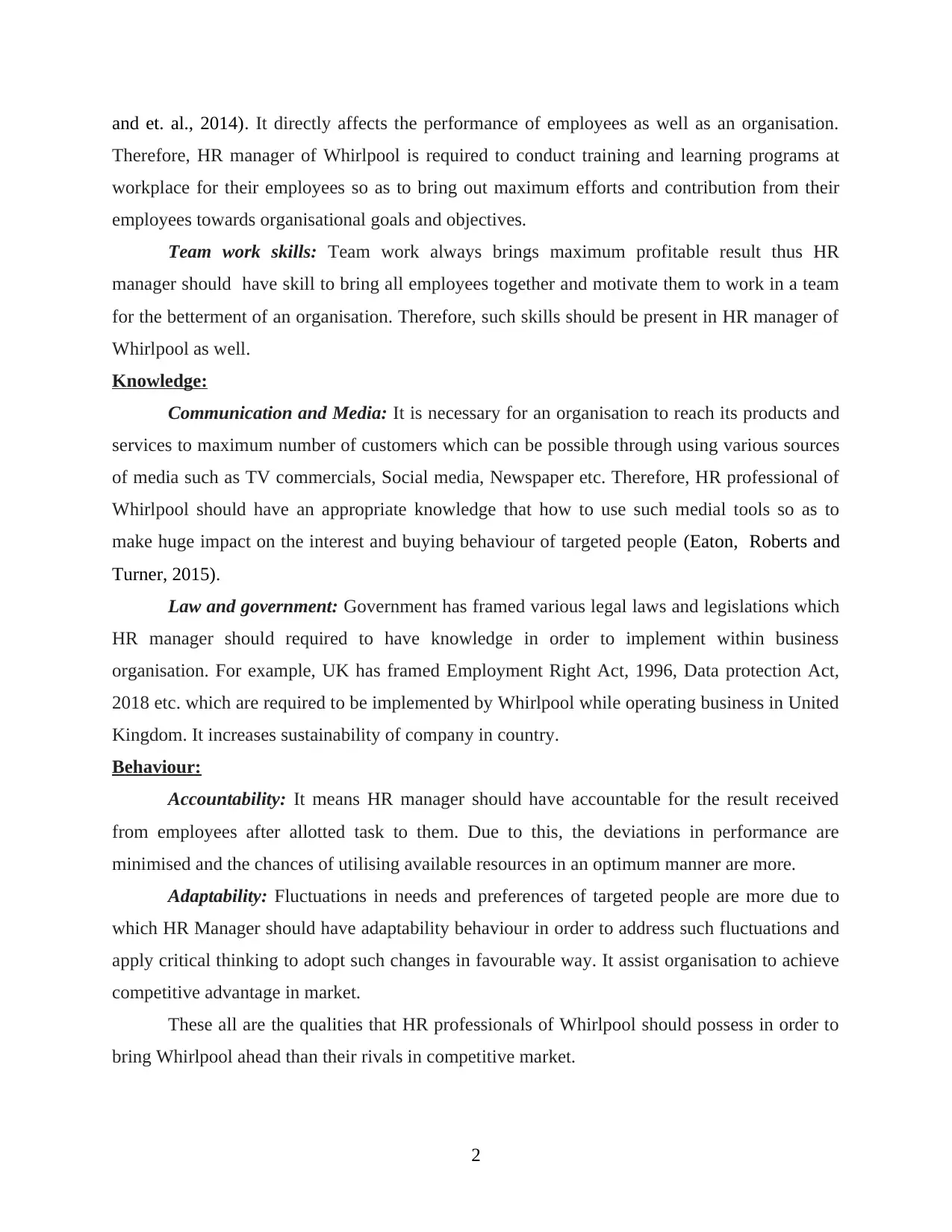
and et. al., 2014). It directly affects the performance of employees as well as an organisation.
Therefore, HR manager of Whirlpool is required to conduct training and learning programs at
workplace for their employees so as to bring out maximum efforts and contribution from their
employees towards organisational goals and objectives.
Team work skills: Team work always brings maximum profitable result thus HR
manager should have skill to bring all employees together and motivate them to work in a team
for the betterment of an organisation. Therefore, such skills should be present in HR manager of
Whirlpool as well.
Knowledge:
Communication and Media: It is necessary for an organisation to reach its products and
services to maximum number of customers which can be possible through using various sources
of media such as TV commercials, Social media, Newspaper etc. Therefore, HR professional of
Whirlpool should have an appropriate knowledge that how to use such medial tools so as to
make huge impact on the interest and buying behaviour of targeted people (Eaton, Roberts and
Turner, 2015).
Law and government: Government has framed various legal laws and legislations which
HR manager should required to have knowledge in order to implement within business
organisation. For example, UK has framed Employment Right Act, 1996, Data protection Act,
2018 etc. which are required to be implemented by Whirlpool while operating business in United
Kingdom. It increases sustainability of company in country.
Behaviour:
Accountability: It means HR manager should have accountable for the result received
from employees after allotted task to them. Due to this, the deviations in performance are
minimised and the chances of utilising available resources in an optimum manner are more.
Adaptability: Fluctuations in needs and preferences of targeted people are more due to
which HR Manager should have adaptability behaviour in order to address such fluctuations and
apply critical thinking to adopt such changes in favourable way. It assist organisation to achieve
competitive advantage in market.
These all are the qualities that HR professionals of Whirlpool should possess in order to
bring Whirlpool ahead than their rivals in competitive market.
2
Therefore, HR manager of Whirlpool is required to conduct training and learning programs at
workplace for their employees so as to bring out maximum efforts and contribution from their
employees towards organisational goals and objectives.
Team work skills: Team work always brings maximum profitable result thus HR
manager should have skill to bring all employees together and motivate them to work in a team
for the betterment of an organisation. Therefore, such skills should be present in HR manager of
Whirlpool as well.
Knowledge:
Communication and Media: It is necessary for an organisation to reach its products and
services to maximum number of customers which can be possible through using various sources
of media such as TV commercials, Social media, Newspaper etc. Therefore, HR professional of
Whirlpool should have an appropriate knowledge that how to use such medial tools so as to
make huge impact on the interest and buying behaviour of targeted people (Eaton, Roberts and
Turner, 2015).
Law and government: Government has framed various legal laws and legislations which
HR manager should required to have knowledge in order to implement within business
organisation. For example, UK has framed Employment Right Act, 1996, Data protection Act,
2018 etc. which are required to be implemented by Whirlpool while operating business in United
Kingdom. It increases sustainability of company in country.
Behaviour:
Accountability: It means HR manager should have accountable for the result received
from employees after allotted task to them. Due to this, the deviations in performance are
minimised and the chances of utilising available resources in an optimum manner are more.
Adaptability: Fluctuations in needs and preferences of targeted people are more due to
which HR Manager should have adaptability behaviour in order to address such fluctuations and
apply critical thinking to adopt such changes in favourable way. It assist organisation to achieve
competitive advantage in market.
These all are the qualities that HR professionals of Whirlpool should possess in order to
bring Whirlpool ahead than their rivals in competitive market.
2
Paraphrase This Document
Need a fresh take? Get an instant paraphrase of this document with our AI Paraphraser
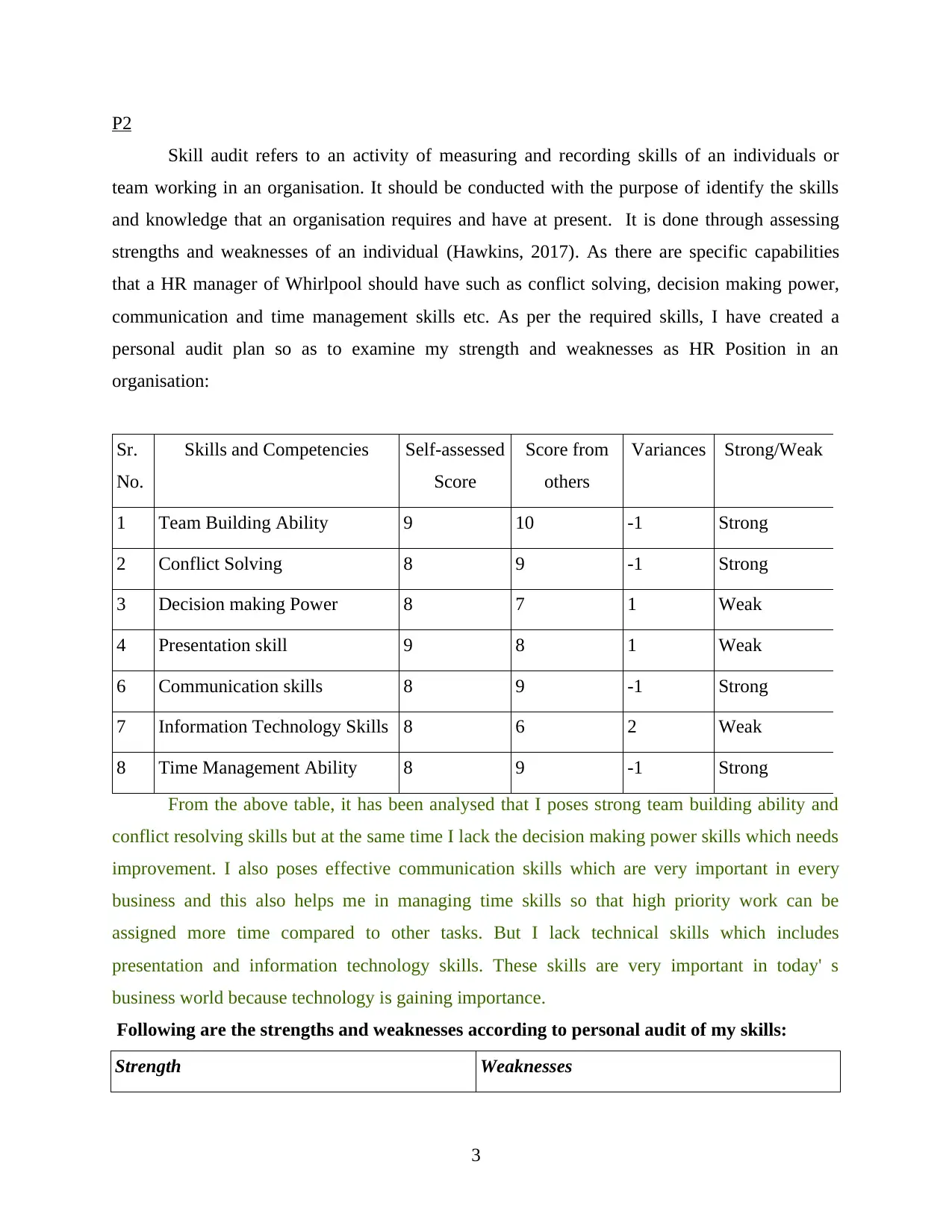
P2
Skill audit refers to an activity of measuring and recording skills of an individuals or
team working in an organisation. It should be conducted with the purpose of identify the skills
and knowledge that an organisation requires and have at present. It is done through assessing
strengths and weaknesses of an individual (Hawkins, 2017). As there are specific capabilities
that a HR manager of Whirlpool should have such as conflict solving, decision making power,
communication and time management skills etc. As per the required skills, I have created a
personal audit plan so as to examine my strength and weaknesses as HR Position in an
organisation:
Sr.
No.
Skills and Competencies Self-assessed
Score
Score from
others
Variances Strong/Weak
1 Team Building Ability 9 10 -1 Strong
2 Conflict Solving 8 9 -1 Strong
3 Decision making Power 8 7 1 Weak
4 Presentation skill 9 8 1 Weak
6 Communication skills 8 9 -1 Strong
7 Information Technology Skills 8 6 2 Weak
8 Time Management Ability 8 9 -1 Strong
From the above table, it has been analysed that I poses strong team building ability and
conflict resolving skills but at the same time I lack the decision making power skills which needs
improvement. I also poses effective communication skills which are very important in every
business and this also helps me in managing time skills so that high priority work can be
assigned more time compared to other tasks. But I lack technical skills which includes
presentation and information technology skills. These skills are very important in today' s
business world because technology is gaining importance.
Following are the strengths and weaknesses according to personal audit of my skills:
Strength Weaknesses
3
Skill audit refers to an activity of measuring and recording skills of an individuals or
team working in an organisation. It should be conducted with the purpose of identify the skills
and knowledge that an organisation requires and have at present. It is done through assessing
strengths and weaknesses of an individual (Hawkins, 2017). As there are specific capabilities
that a HR manager of Whirlpool should have such as conflict solving, decision making power,
communication and time management skills etc. As per the required skills, I have created a
personal audit plan so as to examine my strength and weaknesses as HR Position in an
organisation:
Sr.
No.
Skills and Competencies Self-assessed
Score
Score from
others
Variances Strong/Weak
1 Team Building Ability 9 10 -1 Strong
2 Conflict Solving 8 9 -1 Strong
3 Decision making Power 8 7 1 Weak
4 Presentation skill 9 8 1 Weak
6 Communication skills 8 9 -1 Strong
7 Information Technology Skills 8 6 2 Weak
8 Time Management Ability 8 9 -1 Strong
From the above table, it has been analysed that I poses strong team building ability and
conflict resolving skills but at the same time I lack the decision making power skills which needs
improvement. I also poses effective communication skills which are very important in every
business and this also helps me in managing time skills so that high priority work can be
assigned more time compared to other tasks. But I lack technical skills which includes
presentation and information technology skills. These skills are very important in today' s
business world because technology is gaining importance.
Following are the strengths and weaknesses according to personal audit of my skills:
Strength Weaknesses
3
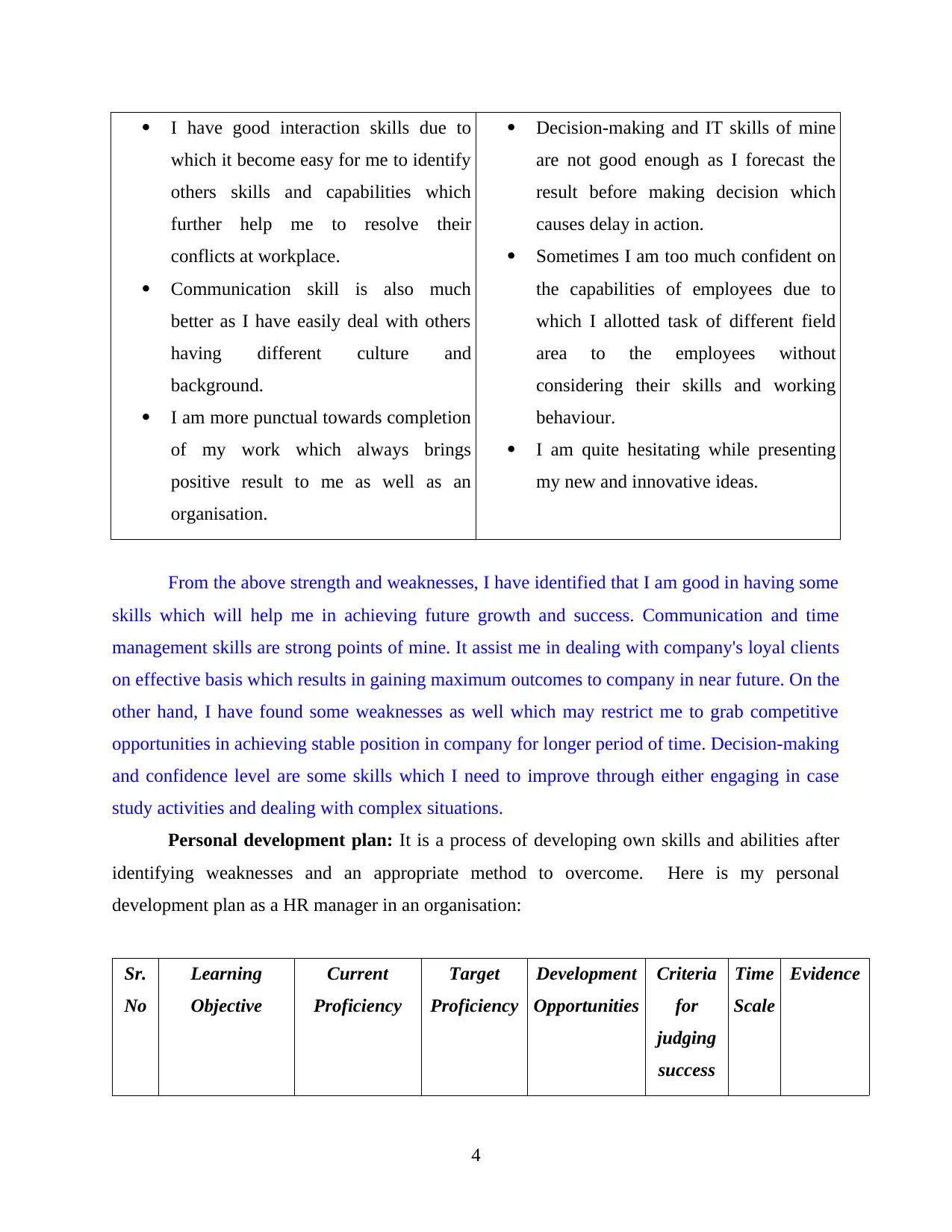
I have good interaction skills due to
which it become easy for me to identify
others skills and capabilities which
further help me to resolve their
conflicts at workplace.
Communication skill is also much
better as I have easily deal with others
having different culture and
background.
I am more punctual towards completion
of my work which always brings
positive result to me as well as an
organisation.
Decision-making and IT skills of mine
are not good enough as I forecast the
result before making decision which
causes delay in action.
Sometimes I am too much confident on
the capabilities of employees due to
which I allotted task of different field
area to the employees without
considering their skills and working
behaviour.
I am quite hesitating while presenting
my new and innovative ideas.
From the above strength and weaknesses, I have identified that I am good in having some
skills which will help me in achieving future growth and success. Communication and time
management skills are strong points of mine. It assist me in dealing with company's loyal clients
on effective basis which results in gaining maximum outcomes to company in near future. On the
other hand, I have found some weaknesses as well which may restrict me to grab competitive
opportunities in achieving stable position in company for longer period of time. Decision-making
and confidence level are some skills which I need to improve through either engaging in case
study activities and dealing with complex situations.
Personal development plan: It is a process of developing own skills and abilities after
identifying weaknesses and an appropriate method to overcome. Here is my personal
development plan as a HR manager in an organisation:
Sr.
No
Learning
Objective
Current
Proficiency
Target
Proficiency
Development
Opportunities
Criteria
for
judging
success
Time
Scale
Evidence
4
which it become easy for me to identify
others skills and capabilities which
further help me to resolve their
conflicts at workplace.
Communication skill is also much
better as I have easily deal with others
having different culture and
background.
I am more punctual towards completion
of my work which always brings
positive result to me as well as an
organisation.
Decision-making and IT skills of mine
are not good enough as I forecast the
result before making decision which
causes delay in action.
Sometimes I am too much confident on
the capabilities of employees due to
which I allotted task of different field
area to the employees without
considering their skills and working
behaviour.
I am quite hesitating while presenting
my new and innovative ideas.
From the above strength and weaknesses, I have identified that I am good in having some
skills which will help me in achieving future growth and success. Communication and time
management skills are strong points of mine. It assist me in dealing with company's loyal clients
on effective basis which results in gaining maximum outcomes to company in near future. On the
other hand, I have found some weaknesses as well which may restrict me to grab competitive
opportunities in achieving stable position in company for longer period of time. Decision-making
and confidence level are some skills which I need to improve through either engaging in case
study activities and dealing with complex situations.
Personal development plan: It is a process of developing own skills and abilities after
identifying weaknesses and an appropriate method to overcome. Here is my personal
development plan as a HR manager in an organisation:
Sr.
No
Learning
Objective
Current
Proficiency
Target
Proficiency
Development
Opportunities
Criteria
for
judging
success
Time
Scale
Evidence
4
⊘ This is a preview!⊘
Do you want full access?
Subscribe today to unlock all pages.

Trusted by 1+ million students worldwide
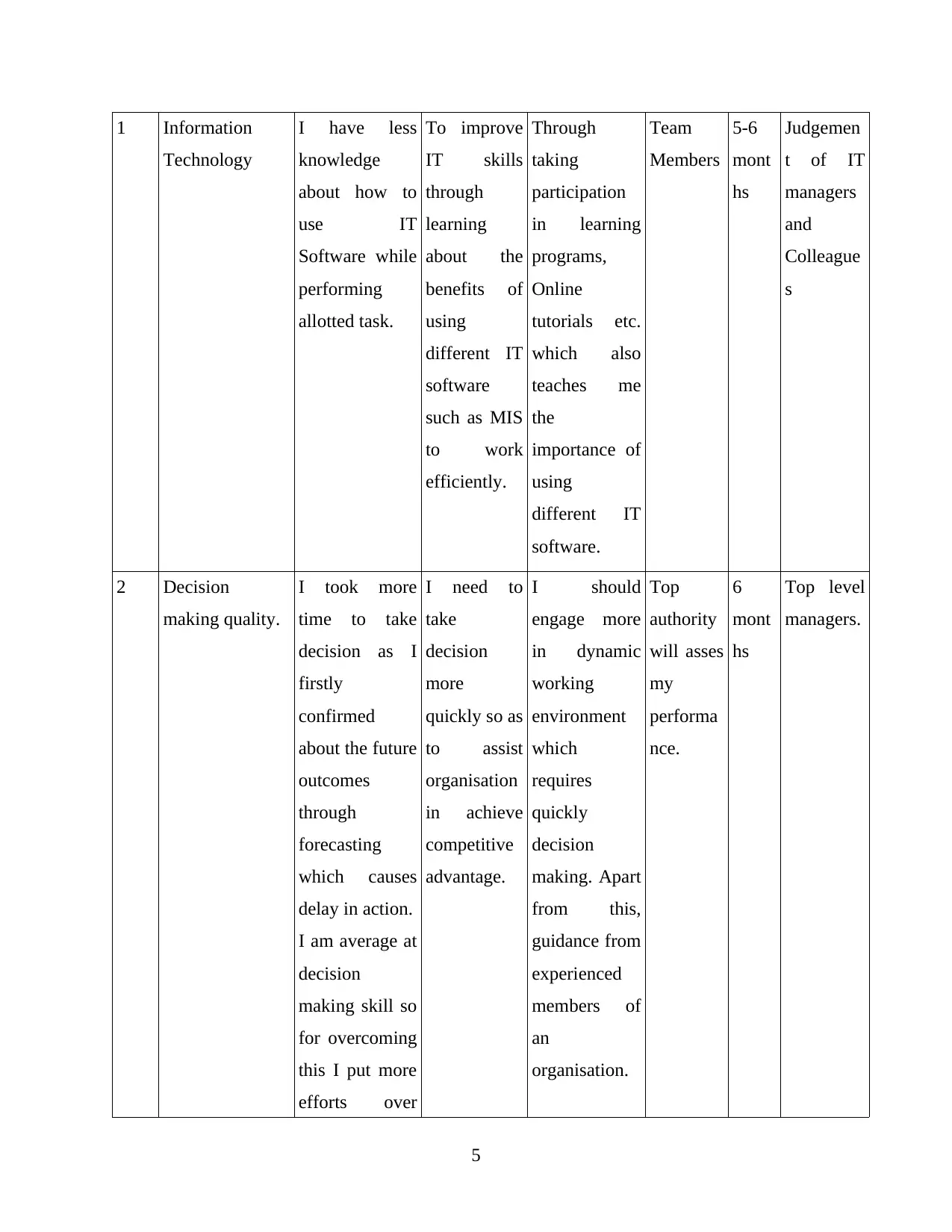
1 Information
Technology
I have less
knowledge
about how to
use IT
Software while
performing
allotted task.
To improve
IT skills
through
learning
about the
benefits of
using
different IT
software
such as MIS
to work
efficiently.
Through
taking
participation
in learning
programs,
Online
tutorials etc.
which also
teaches me
the
importance of
using
different IT
software.
Team
Members
5-6
mont
hs
Judgemen
t of IT
managers
and
Colleague
s
2 Decision
making quality.
I took more
time to take
decision as I
firstly
confirmed
about the future
outcomes
through
forecasting
which causes
delay in action.
I am average at
decision
making skill so
for overcoming
this I put more
efforts over
I need to
take
decision
more
quickly so as
to assist
organisation
in achieve
competitive
advantage.
I should
engage more
in dynamic
working
environment
which
requires
quickly
decision
making. Apart
from this,
guidance from
experienced
members of
an
organisation.
Top
authority
will asses
my
performa
nce.
6
mont
hs
Top level
managers.
5
Technology
I have less
knowledge
about how to
use IT
Software while
performing
allotted task.
To improve
IT skills
through
learning
about the
benefits of
using
different IT
software
such as MIS
to work
efficiently.
Through
taking
participation
in learning
programs,
Online
tutorials etc.
which also
teaches me
the
importance of
using
different IT
software.
Team
Members
5-6
mont
hs
Judgemen
t of IT
managers
and
Colleague
s
2 Decision
making quality.
I took more
time to take
decision as I
firstly
confirmed
about the future
outcomes
through
forecasting
which causes
delay in action.
I am average at
decision
making skill so
for overcoming
this I put more
efforts over
I need to
take
decision
more
quickly so as
to assist
organisation
in achieve
competitive
advantage.
I should
engage more
in dynamic
working
environment
which
requires
quickly
decision
making. Apart
from this,
guidance from
experienced
members of
an
organisation.
Top
authority
will asses
my
performa
nce.
6
mont
hs
Top level
managers.
5
Paraphrase This Document
Need a fresh take? Get an instant paraphrase of this document with our AI Paraphraser
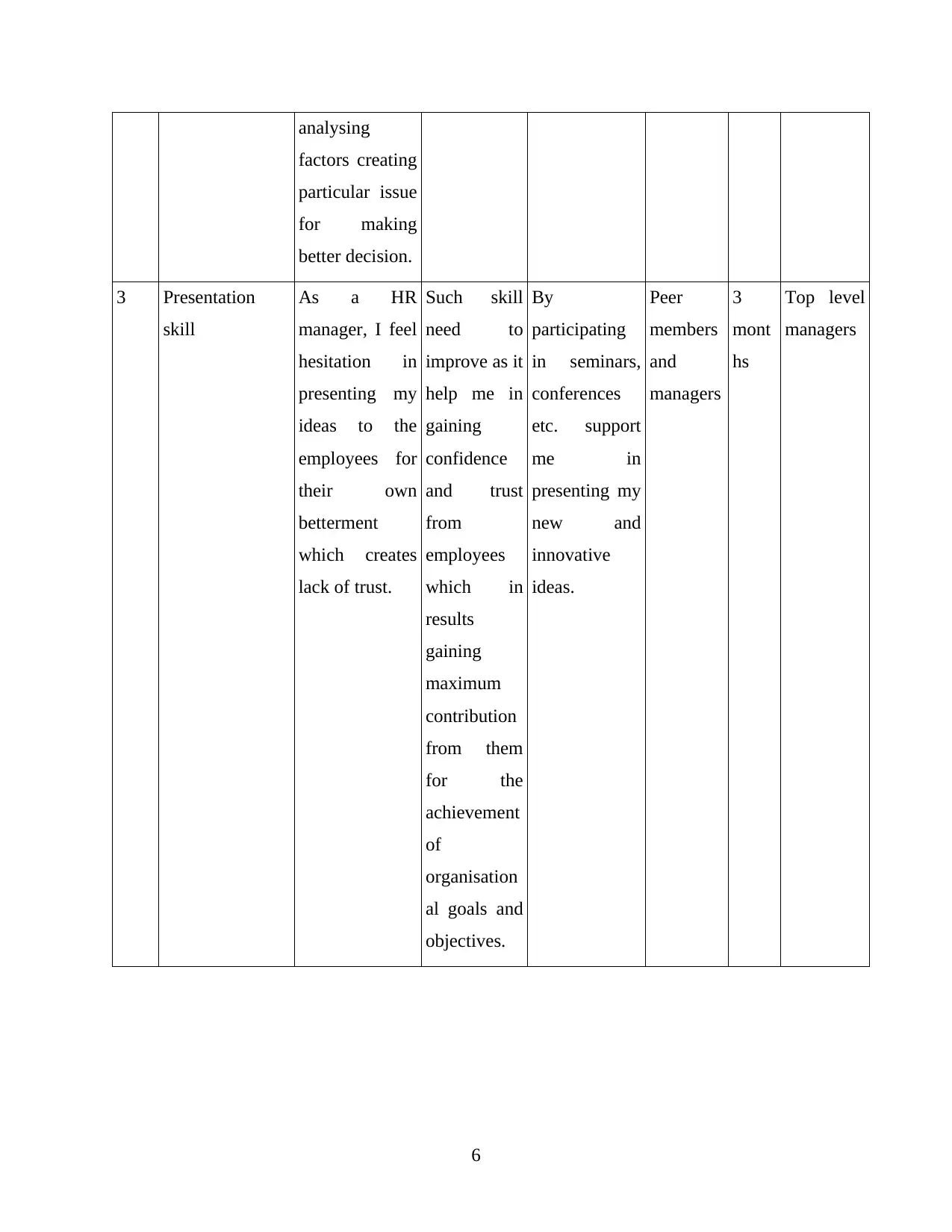
analysing
factors creating
particular issue
for making
better decision.
3 Presentation
skill
As a HR
manager, I feel
hesitation in
presenting my
ideas to the
employees for
their own
betterment
which creates
lack of trust.
Such skill
need to
improve as it
help me in
gaining
confidence
and trust
from
employees
which in
results
gaining
maximum
contribution
from them
for the
achievement
of
organisation
al goals and
objectives.
By
participating
in seminars,
conferences
etc. support
me in
presenting my
new and
innovative
ideas.
Peer
members
and
managers
3
mont
hs
Top level
managers
6
factors creating
particular issue
for making
better decision.
3 Presentation
skill
As a HR
manager, I feel
hesitation in
presenting my
ideas to the
employees for
their own
betterment
which creates
lack of trust.
Such skill
need to
improve as it
help me in
gaining
confidence
and trust
from
employees
which in
results
gaining
maximum
contribution
from them
for the
achievement
of
organisation
al goals and
objectives.
By
participating
in seminars,
conferences
etc. support
me in
presenting my
new and
innovative
ideas.
Peer
members
and
managers
3
mont
hs
Top level
managers
6
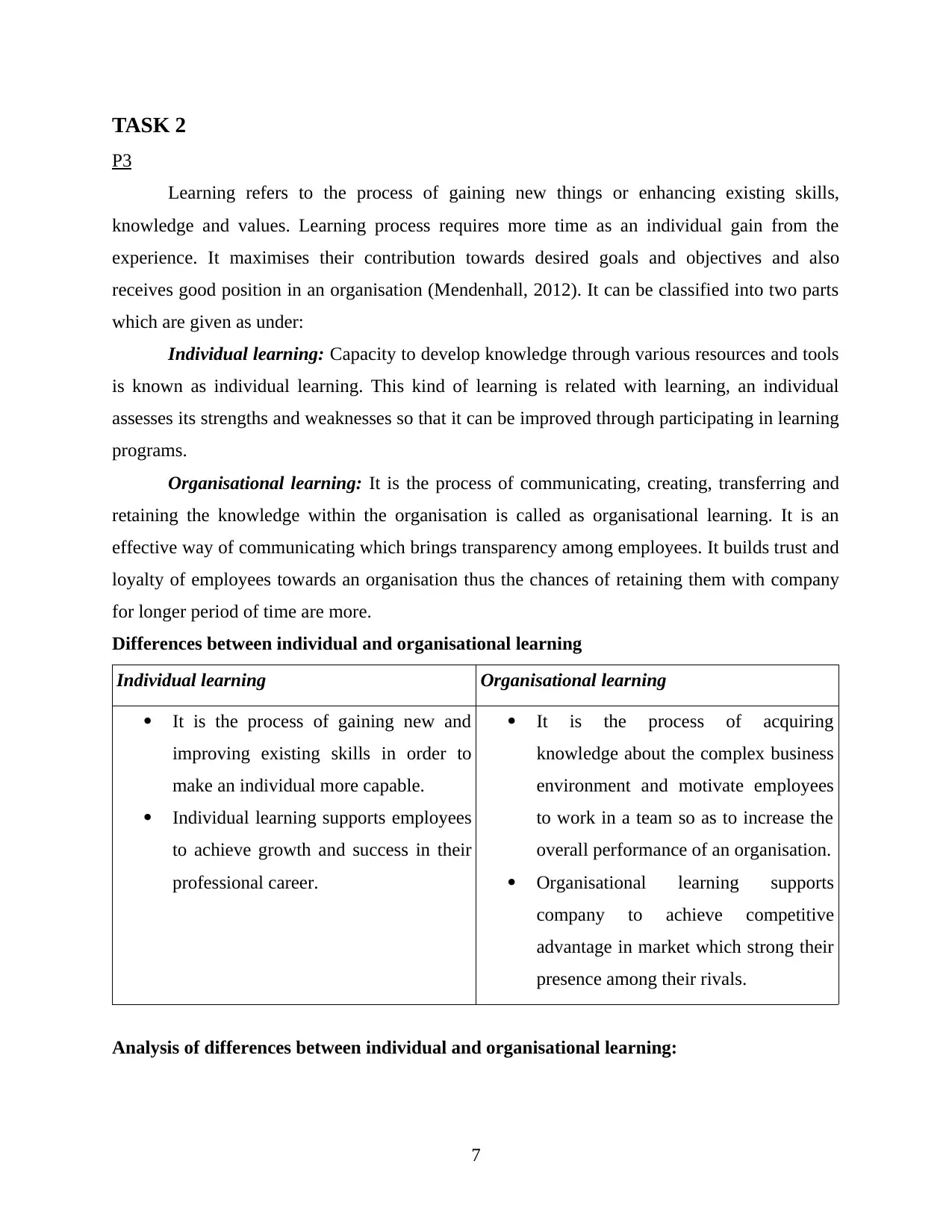
TASK 2
P3
Learning refers to the process of gaining new things or enhancing existing skills,
knowledge and values. Learning process requires more time as an individual gain from the
experience. It maximises their contribution towards desired goals and objectives and also
receives good position in an organisation (Mendenhall, 2012). It can be classified into two parts
which are given as under:
Individual learning: Capacity to develop knowledge through various resources and tools
is known as individual learning. This kind of learning is related with learning, an individual
assesses its strengths and weaknesses so that it can be improved through participating in learning
programs.
Organisational learning: It is the process of communicating, creating, transferring and
retaining the knowledge within the organisation is called as organisational learning. It is an
effective way of communicating which brings transparency among employees. It builds trust and
loyalty of employees towards an organisation thus the chances of retaining them with company
for longer period of time are more.
Differences between individual and organisational learning
Individual learning Organisational learning
It is the process of gaining new and
improving existing skills in order to
make an individual more capable.
Individual learning supports employees
to achieve growth and success in their
professional career.
It is the process of acquiring
knowledge about the complex business
environment and motivate employees
to work in a team so as to increase the
overall performance of an organisation.
Organisational learning supports
company to achieve competitive
advantage in market which strong their
presence among their rivals.
Analysis of differences between individual and organisational learning:
7
P3
Learning refers to the process of gaining new things or enhancing existing skills,
knowledge and values. Learning process requires more time as an individual gain from the
experience. It maximises their contribution towards desired goals and objectives and also
receives good position in an organisation (Mendenhall, 2012). It can be classified into two parts
which are given as under:
Individual learning: Capacity to develop knowledge through various resources and tools
is known as individual learning. This kind of learning is related with learning, an individual
assesses its strengths and weaknesses so that it can be improved through participating in learning
programs.
Organisational learning: It is the process of communicating, creating, transferring and
retaining the knowledge within the organisation is called as organisational learning. It is an
effective way of communicating which brings transparency among employees. It builds trust and
loyalty of employees towards an organisation thus the chances of retaining them with company
for longer period of time are more.
Differences between individual and organisational learning
Individual learning Organisational learning
It is the process of gaining new and
improving existing skills in order to
make an individual more capable.
Individual learning supports employees
to achieve growth and success in their
professional career.
It is the process of acquiring
knowledge about the complex business
environment and motivate employees
to work in a team so as to increase the
overall performance of an organisation.
Organisational learning supports
company to achieve competitive
advantage in market which strong their
presence among their rivals.
Analysis of differences between individual and organisational learning:
7
⊘ This is a preview!⊘
Do you want full access?
Subscribe today to unlock all pages.

Trusted by 1+ million students worldwide
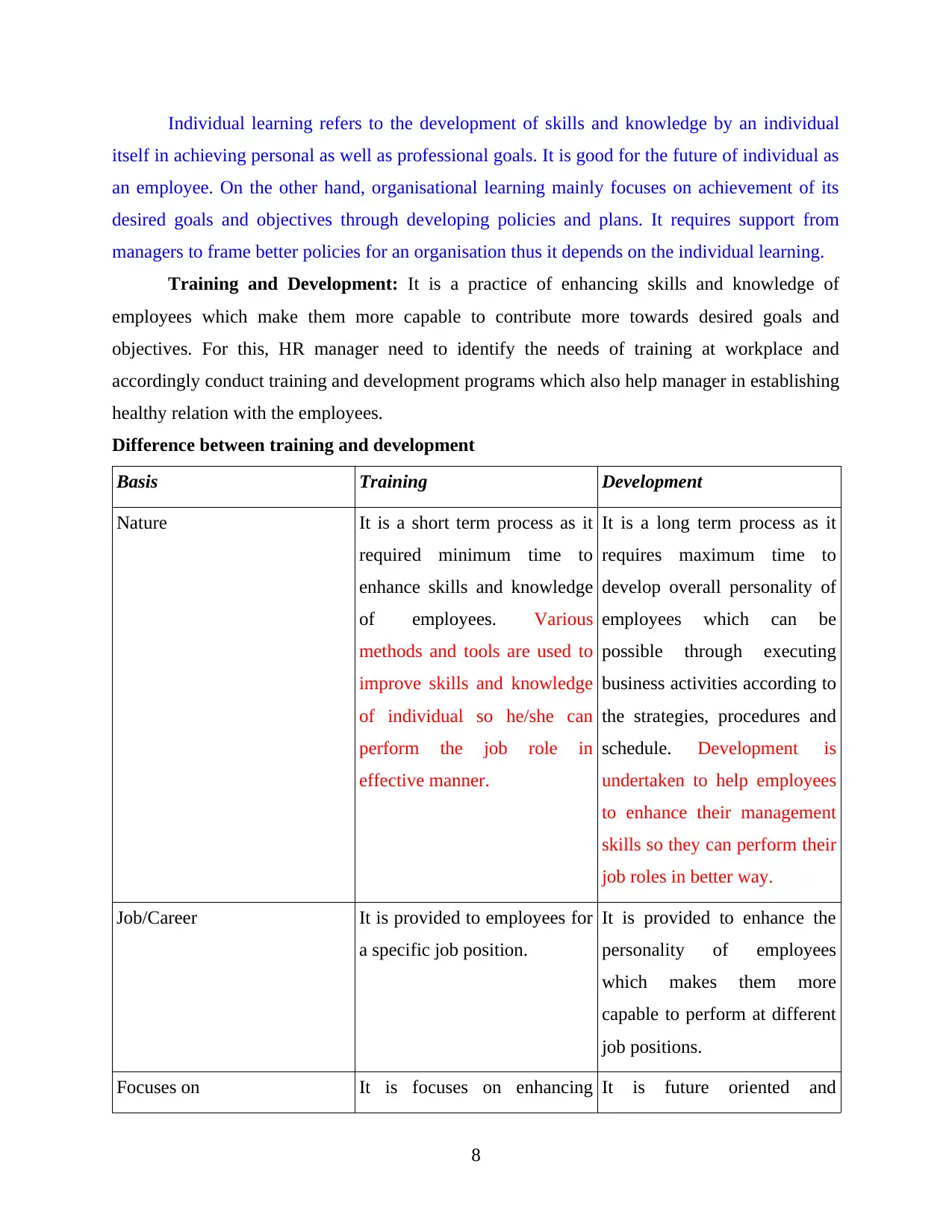
Individual learning refers to the development of skills and knowledge by an individual
itself in achieving personal as well as professional goals. It is good for the future of individual as
an employee. On the other hand, organisational learning mainly focuses on achievement of its
desired goals and objectives through developing policies and plans. It requires support from
managers to frame better policies for an organisation thus it depends on the individual learning.
Training and Development: It is a practice of enhancing skills and knowledge of
employees which make them more capable to contribute more towards desired goals and
objectives. For this, HR manager need to identify the needs of training at workplace and
accordingly conduct training and development programs which also help manager in establishing
healthy relation with the employees.
Difference between training and development
Basis Training Development
Nature It is a short term process as it
required minimum time to
enhance skills and knowledge
of employees. Various
methods and tools are used to
improve skills and knowledge
of individual so he/she can
perform the job role in
effective manner.
It is a long term process as it
requires maximum time to
develop overall personality of
employees which can be
possible through executing
business activities according to
the strategies, procedures and
schedule. Development is
undertaken to help employees
to enhance their management
skills so they can perform their
job roles in better way.
Job/Career It is provided to employees for
a specific job position.
It is provided to enhance the
personality of employees
which makes them more
capable to perform at different
job positions.
Focuses on It is focuses on enhancing It is future oriented and
8
itself in achieving personal as well as professional goals. It is good for the future of individual as
an employee. On the other hand, organisational learning mainly focuses on achievement of its
desired goals and objectives through developing policies and plans. It requires support from
managers to frame better policies for an organisation thus it depends on the individual learning.
Training and Development: It is a practice of enhancing skills and knowledge of
employees which make them more capable to contribute more towards desired goals and
objectives. For this, HR manager need to identify the needs of training at workplace and
accordingly conduct training and development programs which also help manager in establishing
healthy relation with the employees.
Difference between training and development
Basis Training Development
Nature It is a short term process as it
required minimum time to
enhance skills and knowledge
of employees. Various
methods and tools are used to
improve skills and knowledge
of individual so he/she can
perform the job role in
effective manner.
It is a long term process as it
requires maximum time to
develop overall personality of
employees which can be
possible through executing
business activities according to
the strategies, procedures and
schedule. Development is
undertaken to help employees
to enhance their management
skills so they can perform their
job roles in better way.
Job/Career It is provided to employees for
a specific job position.
It is provided to enhance the
personality of employees
which makes them more
capable to perform at different
job positions.
Focuses on It is focuses on enhancing It is future oriented and
8
Paraphrase This Document
Need a fresh take? Get an instant paraphrase of this document with our AI Paraphraser
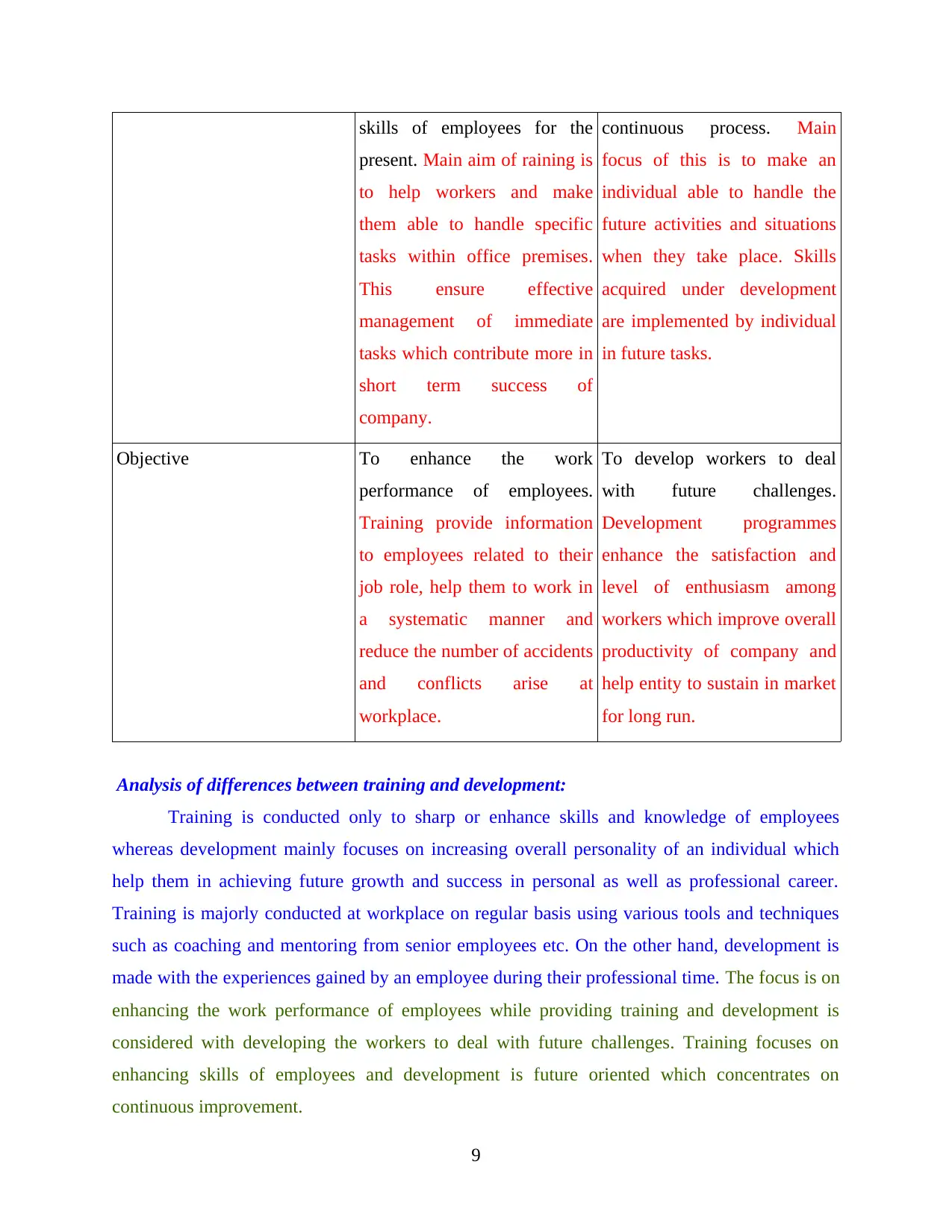
skills of employees for the
present. Main aim of raining is
to help workers and make
them able to handle specific
tasks within office premises.
This ensure effective
management of immediate
tasks which contribute more in
short term success of
company.
continuous process. Main
focus of this is to make an
individual able to handle the
future activities and situations
when they take place. Skills
acquired under development
are implemented by individual
in future tasks.
Objective To enhance the work
performance of employees.
Training provide information
to employees related to their
job role, help them to work in
a systematic manner and
reduce the number of accidents
and conflicts arise at
workplace.
To develop workers to deal
with future challenges.
Development programmes
enhance the satisfaction and
level of enthusiasm among
workers which improve overall
productivity of company and
help entity to sustain in market
for long run.
Analysis of differences between training and development:
Training is conducted only to sharp or enhance skills and knowledge of employees
whereas development mainly focuses on increasing overall personality of an individual which
help them in achieving future growth and success in personal as well as professional career.
Training is majorly conducted at workplace on regular basis using various tools and techniques
such as coaching and mentoring from senior employees etc. On the other hand, development is
made with the experiences gained by an employee during their professional time. The focus is on
enhancing the work performance of employees while providing training and development is
considered with developing the workers to deal with future challenges. Training focuses on
enhancing skills of employees and development is future oriented which concentrates on
continuous improvement.
9
present. Main aim of raining is
to help workers and make
them able to handle specific
tasks within office premises.
This ensure effective
management of immediate
tasks which contribute more in
short term success of
company.
continuous process. Main
focus of this is to make an
individual able to handle the
future activities and situations
when they take place. Skills
acquired under development
are implemented by individual
in future tasks.
Objective To enhance the work
performance of employees.
Training provide information
to employees related to their
job role, help them to work in
a systematic manner and
reduce the number of accidents
and conflicts arise at
workplace.
To develop workers to deal
with future challenges.
Development programmes
enhance the satisfaction and
level of enthusiasm among
workers which improve overall
productivity of company and
help entity to sustain in market
for long run.
Analysis of differences between training and development:
Training is conducted only to sharp or enhance skills and knowledge of employees
whereas development mainly focuses on increasing overall personality of an individual which
help them in achieving future growth and success in personal as well as professional career.
Training is majorly conducted at workplace on regular basis using various tools and techniques
such as coaching and mentoring from senior employees etc. On the other hand, development is
made with the experiences gained by an employee during their professional time. The focus is on
enhancing the work performance of employees while providing training and development is
considered with developing the workers to deal with future challenges. Training focuses on
enhancing skills of employees and development is future oriented which concentrates on
continuous improvement.
9
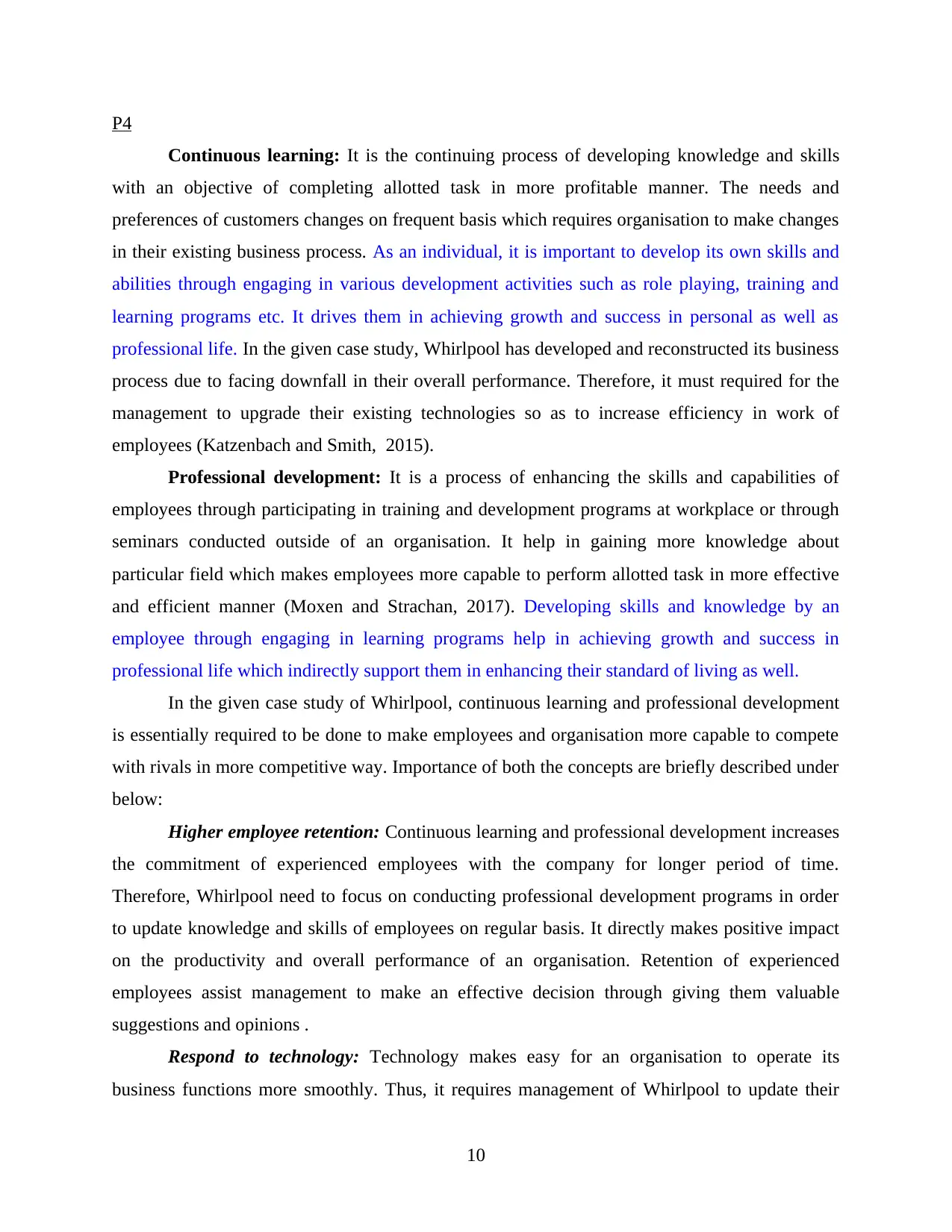
P4
Continuous learning: It is the continuing process of developing knowledge and skills
with an objective of completing allotted task in more profitable manner. The needs and
preferences of customers changes on frequent basis which requires organisation to make changes
in their existing business process. As an individual, it is important to develop its own skills and
abilities through engaging in various development activities such as role playing, training and
learning programs etc. It drives them in achieving growth and success in personal as well as
professional life. In the given case study, Whirlpool has developed and reconstructed its business
process due to facing downfall in their overall performance. Therefore, it must required for the
management to upgrade their existing technologies so as to increase efficiency in work of
employees (Katzenbach and Smith, 2015).
Professional development: It is a process of enhancing the skills and capabilities of
employees through participating in training and development programs at workplace or through
seminars conducted outside of an organisation. It help in gaining more knowledge about
particular field which makes employees more capable to perform allotted task in more effective
and efficient manner (Moxen and Strachan, 2017). Developing skills and knowledge by an
employee through engaging in learning programs help in achieving growth and success in
professional life which indirectly support them in enhancing their standard of living as well.
In the given case study of Whirlpool, continuous learning and professional development
is essentially required to be done to make employees and organisation more capable to compete
with rivals in more competitive way. Importance of both the concepts are briefly described under
below:
Higher employee retention: Continuous learning and professional development increases
the commitment of experienced employees with the company for longer period of time.
Therefore, Whirlpool need to focus on conducting professional development programs in order
to update knowledge and skills of employees on regular basis. It directly makes positive impact
on the productivity and overall performance of an organisation. Retention of experienced
employees assist management to make an effective decision through giving them valuable
suggestions and opinions .
Respond to technology: Technology makes easy for an organisation to operate its
business functions more smoothly. Thus, it requires management of Whirlpool to update their
10
Continuous learning: It is the continuing process of developing knowledge and skills
with an objective of completing allotted task in more profitable manner. The needs and
preferences of customers changes on frequent basis which requires organisation to make changes
in their existing business process. As an individual, it is important to develop its own skills and
abilities through engaging in various development activities such as role playing, training and
learning programs etc. It drives them in achieving growth and success in personal as well as
professional life. In the given case study, Whirlpool has developed and reconstructed its business
process due to facing downfall in their overall performance. Therefore, it must required for the
management to upgrade their existing technologies so as to increase efficiency in work of
employees (Katzenbach and Smith, 2015).
Professional development: It is a process of enhancing the skills and capabilities of
employees through participating in training and development programs at workplace or through
seminars conducted outside of an organisation. It help in gaining more knowledge about
particular field which makes employees more capable to perform allotted task in more effective
and efficient manner (Moxen and Strachan, 2017). Developing skills and knowledge by an
employee through engaging in learning programs help in achieving growth and success in
professional life which indirectly support them in enhancing their standard of living as well.
In the given case study of Whirlpool, continuous learning and professional development
is essentially required to be done to make employees and organisation more capable to compete
with rivals in more competitive way. Importance of both the concepts are briefly described under
below:
Higher employee retention: Continuous learning and professional development increases
the commitment of experienced employees with the company for longer period of time.
Therefore, Whirlpool need to focus on conducting professional development programs in order
to update knowledge and skills of employees on regular basis. It directly makes positive impact
on the productivity and overall performance of an organisation. Retention of experienced
employees assist management to make an effective decision through giving them valuable
suggestions and opinions .
Respond to technology: Technology makes easy for an organisation to operate its
business functions more smoothly. Thus, it requires management of Whirlpool to update their
10
⊘ This is a preview!⊘
Do you want full access?
Subscribe today to unlock all pages.

Trusted by 1+ million students worldwide
1 out of 17
Related Documents
Your All-in-One AI-Powered Toolkit for Academic Success.
+13062052269
info@desklib.com
Available 24*7 on WhatsApp / Email
![[object Object]](/_next/static/media/star-bottom.7253800d.svg)
Unlock your academic potential
Copyright © 2020–2026 A2Z Services. All Rights Reserved. Developed and managed by ZUCOL.





